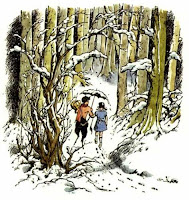It would be impossible to review this novel about a teenage girl who falls in love with a werewolf without comparing it to Twilight, so I won't even try. Indeed, there is a lot that is similar about the two books, including the peripheral mythical-creature characters who seem to have come from the same mould: benevolent father-figure, angry female, rather unhinged, angry one. However, it is a shame to me that Twilight is the one that is in the centre of teen culture at the moment, and that Shiver is overlooked as yet another paranormal romance, a bandwagon-jumper. I won't deny that it fits right into those categories, and don't claim that it is Great Literature, but it is, at least, better. (And not because I like werewolves, and am sick of vampires, especially of the Black Ribbon variety out of the context of the Black Ribbon.)
Firstly, the relationship between Grace and Sam is more than mere idolisation/"I want to drink your blood." When Grace was a little girl, she was attacked by a pack of wolves that lived in the woods behind her house, but saved by one of their own, a wolf with bright yellow eyes. As she grows up, she becomes fascinated by the wolves to the point of obsession. She is an introverted, lonely girl who longs for her parents to give her more attention. When she meets Sam as a boy her own age, and recognises by his yellow eyes that he is the same wolf who saved her, a werewolf, yes, it is a strange love-at-first-sight moment, she is obsessed with the wolf, so inevitably if he is also human and eligible, she can't do anything but fall in love with him. But when she was attacked, she was bitten. She should be a werewolf too, but for some reason she never changed. But there is something of the werewolf nature in her. She has this shared experience with Sam, and shared memories, even shared dreams.
We see their relationship developing as boy-and girlfriends, read about them making breakfast together, spending time in a bookshop, doing normal couple-things and coming to know each other. But Sam is struggling against his nature as werewolf. Unlike Edward "Mr Sparkle" Cullen, this battle is visible, not just his saying, "I'm dangerous. No, really, I am." Because the werewolves of Shiver are not subject to the phases of the moon, but the changing seasons. They are human in the summer, and wolves in the winter. Yet with each change, they lose a little of themselves. They stay wolves for longer each year, and shorter times as humans, until eventually they are wolves the whole year round. This is Sam's last year as a human, and it is a real battle to keep from changing that last time, to spend as much time as he possibly can with Grace.
Stiefvater's descriptions of the Minnesota setting as the year approaches winter are, in my opinion, the most vivid part of the book: atmospheric, isolated and chilly. The small details come together subtly, woven into the narrative so that I didn't really notice them until I realised that I knew exactly what Grace's home looked like: a large, wooden house with a long porch/verandah along one side. It is the only house visible, set back from the road with a large, frosty yard. Behind the house, all you can see is miles and miles of trees. It is not actually snowing in my mind's picture, but the frost is on the ground turning it white and crunchy.








